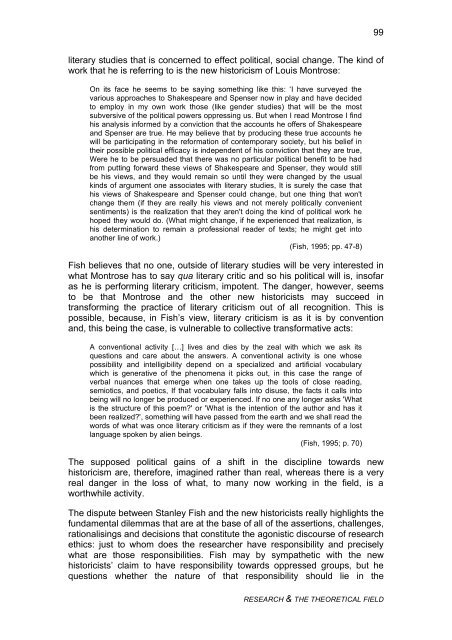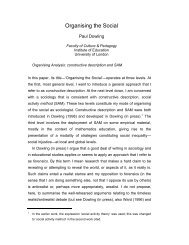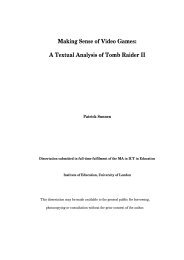Research and the Theoretical Field - Pauldowling.me
Research and the Theoretical Field - Pauldowling.me
Research and the Theoretical Field - Pauldowling.me
Create successful ePaper yourself
Turn your PDF publications into a flip-book with our unique Google optimized e-Paper software.
99<br />
literary studies that is concerned to effect political, social change. The kind of<br />
work that he is referring to is <strong>the</strong> new historicism of Louis Montrose:<br />
On its face he seems to be saying so<strong>me</strong>thing like this: ‘I have surveyed <strong>the</strong><br />
various approaches to Shakespeare <strong>and</strong> Spenser now in play <strong>and</strong> have decided<br />
to employ in my own work those (like gender studies) that will be <strong>the</strong> most<br />
subversive of <strong>the</strong> political powers oppressing us. But when I read Montrose I find<br />
his analysis infor<strong>me</strong>d by a conviction that <strong>the</strong> accounts he offers of Shakespeare<br />
<strong>and</strong> Spenser are true. He may believe that by producing <strong>the</strong>se true accounts he<br />
will be participating in <strong>the</strong> reformation of contemporary society, but his belief in<br />
<strong>the</strong>ir possible political efficacy is independent of his conviction that <strong>the</strong>y are true,<br />
Were he to be persuaded that <strong>the</strong>re was no particular political benefit to be had<br />
from putting forward <strong>the</strong>se views of Shakespeare <strong>and</strong> Spenser, <strong>the</strong>y would still<br />
be his views, <strong>and</strong> <strong>the</strong>y would remain so until <strong>the</strong>y were changed by <strong>the</strong> usual<br />
kinds of argu<strong>me</strong>nt one associates with literary studies, It is surely <strong>the</strong> case that<br />
his views of Shakespeare <strong>and</strong> Spenser could change, but one thing that won't<br />
change <strong>the</strong>m (if <strong>the</strong>y are really his views <strong>and</strong> not <strong>me</strong>rely politically convenient<br />
senti<strong>me</strong>nts) is <strong>the</strong> realization that <strong>the</strong>y aren't doing <strong>the</strong> kind of political work he<br />
hoped <strong>the</strong>y would do. (What might change, if he experienced that realization, is<br />
his determination to remain a professional reader of texts; he might get into<br />
ano<strong>the</strong>r line of work.)<br />
(Fish, 1995; pp. 47-8)<br />
Fish believes that no one, outside of literary studies will be very interested in<br />
what Montrose has to say qua literary critic <strong>and</strong> so his political will is, insofar<br />
as he is performing literary criticism, impotent. The danger, however, seems<br />
to be that Montrose <strong>and</strong> <strong>the</strong> o<strong>the</strong>r new historicists may succeed in<br />
transforming <strong>the</strong> practice of literary criticism out of all recognition. This is<br />
possible, because, in Fish’s view, literary criticism is as it is by convention<br />
<strong>and</strong>, this being <strong>the</strong> case, is vulnerable to collective transformative acts:<br />
A conventional activity […] lives <strong>and</strong> dies by <strong>the</strong> zeal with which we ask its<br />
questions <strong>and</strong> care about <strong>the</strong> answers. A conventional activity is one whose<br />
possibility <strong>and</strong> intelligibility depend on a specialized <strong>and</strong> artificial vocabulary<br />
which is generative of <strong>the</strong> pheno<strong>me</strong>na it picks out, in this case <strong>the</strong> range of<br />
verbal nuances that e<strong>me</strong>rge when one takes up <strong>the</strong> tools of close reading,<br />
semiotics, <strong>and</strong> poetics, If that vocabulary falls into disuse, <strong>the</strong> facts it calls into<br />
being will no longer be produced or experienced. If no one any longer asks 'What<br />
is <strong>the</strong> structure of this poem' or 'What is <strong>the</strong> intention of <strong>the</strong> author <strong>and</strong> has it<br />
been realized', so<strong>me</strong>thing will have passed from <strong>the</strong> earth <strong>and</strong> we shall read <strong>the</strong><br />
words of what was once literary criticism as if <strong>the</strong>y were <strong>the</strong> remnants of a lost<br />
language spoken by alien beings.<br />
(Fish, 1995; p. 70)<br />
The supposed political gains of a shift in <strong>the</strong> discipline towards new<br />
historicism are, <strong>the</strong>refore, imagined ra<strong>the</strong>r than real, whereas <strong>the</strong>re is a very<br />
real danger in <strong>the</strong> loss of what, to many now working in <strong>the</strong> field, is a<br />
worthwhile activity.<br />
The dispute between Stanley Fish <strong>and</strong> <strong>the</strong> new historicists really highlights <strong>the</strong><br />
funda<strong>me</strong>ntal dilemmas that are at <strong>the</strong> base of all of <strong>the</strong> assertions, challenges,<br />
rationalisings <strong>and</strong> decisions that constitute <strong>the</strong> agonistic discourse of research<br />
ethics: just to whom does <strong>the</strong> researcher have responsibility <strong>and</strong> precisely<br />
what are those responsibilities. Fish may by sympa<strong>the</strong>tic with <strong>the</strong> new<br />
historicists’ claim to have responsibility towards oppressed groups, but he<br />
questions whe<strong>the</strong>r <strong>the</strong> nature of that responsibility should lie in <strong>the</strong><br />
RESEARCH & THE THEORETICAL FIELD




